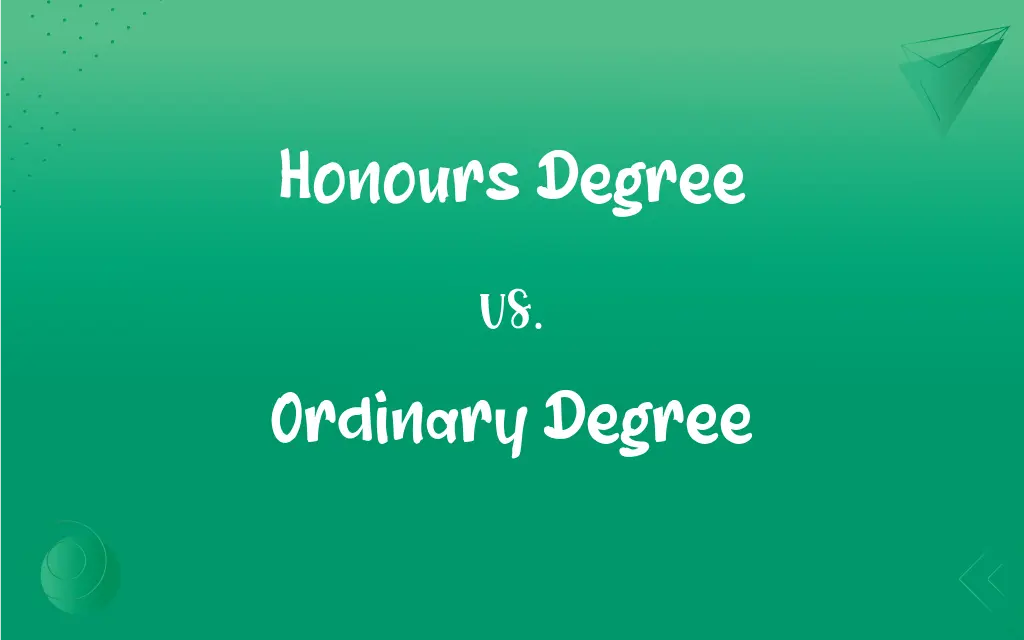Honours Degree vs. Ordinary Degree: What's the Difference?
By Harlon Moss & Janet White || Published on August 12, 2024
Honours degrees involve deeper study and a research project, leading to higher academic recognition, whereas ordinary degrees focus on general education without the research component.

Key Differences
An Honours Degree and an Ordinary Degree differ primarily in their academic depth, duration, and the opportunities they provide to students. An Honours Degree typically requires an additional year of study beyond the Ordinary Degree and often includes a research project or thesis that demonstrates a student’s ability to conduct independent work. Ordinary Degrees, on the other hand, provide a comprehensive overview of a subject area without the depth required for an Honours thesis. These degrees are well-suited for students who are looking to enter the workforce directly after completion of their undergraduate studies or who may not be interested in the research aspects of their field.
The distinction between these two types of degrees can significantly impact a graduate’s career path. Employers and postgraduate programs may view an Honours Degree as a mark of distinction, indicating a higher level of expertise and dedication to the field. This can be particularly important in competitive job markets or academic fields where deep specialized knowledge is valued.
In terms of academic requirements, Honours Degrees typically have higher entry and continuation standards. Students may need to maintain a certain grade point average (GPA) to enter into and remain in an Honours program. These rigorous standards ensure that the students who pursue an Honours Degree are capable of handling the additional workload and the complexity of the research project.
Despite these differences, both Honours and Ordinary Degrees offer valuable educational experiences. The choice between them should be based on a student’s academic interests, career goals, and readiness for the challenges of higher-level academic work. Whether aiming for an Honours or an Ordinary Degree, students will acquire a solid foundation in their field of study.
Comparison Chart
Duration
Typically 4 years, with an additional year for research
Usually 3 years, without a research component
ADVERTISEMENT
Focus
Specialized knowledge with a research project
Broad overview of a subject without specialization
Academic Requirements
Higher entry standards and GPA maintenance required
Standard entry requirements, no GPA threshold for research
Career Opportunities
Opens doors to postgraduate studies and specialized roles
Suitable for direct entry into the workforce
Recognition
Considered a higher academic achievement
Provides foundational knowledge and skills
Honours Degree and Ordinary Degree Definitions
Honours Degree
Focuses on a specific area within a field.
Specializing in clinical psychology in an Honours program.
ADVERTISEMENT
Ordinary Degree
More options to explore different subjects.
Taking elective courses outside the major field of study.
Honours Degree
Requires maintaining a high GPA.
Must achieve a 3.5 GPA to qualify for the Honours program.
Ordinary Degree
Covers a wide range of topics within the subject.
Studying a variety of business management theories.
Honours Degree
Involves a thesis or project showcasing independent research.
Completing an Honours thesis on renewable energy solutions.
Ordinary Degree
Can be a stepping stone.
Pursuing specialized certifications or diplomas after graduation.
Honours Degree
Prepares for further academic research.
Graduates often proceed to master's or PhD programs.
Ordinary Degree
Typically completed in less time.
Achieving a degree in 3 years instead of 4 or 5.
Honours Degree
Enhances prospects in specialized fields.
More competitive for research and academic positions.
Ordinary Degree
Designed for immediate employment.
Graduates quickly find jobs in business, IT, or education.
FAQs
Can you switch from an Ordinary Degree to an Honours Degree?
Yes, in some programs, based on academic performance and availability.
Is an Honours Degree necessary for postgraduate studies?
While not always necessary, it can enhance your application for postgraduate studies.
What are the benefits of an Ordinary Degree?
It offers flexibility, a broad understanding of the field, and quicker entry into the workforce.
What is the main difference between an Honours Degree and an Ordinary Degree?
An Honours Degree includes a research component and specialization, while an Ordinary Degree offers a broad overview without specialization.
Do employers prefer Honours Degrees?
Some employers, especially in research-intensive fields, may prefer or require an Honours Degree.
What kind of research project is involved in an Honours Degree?
Projects vary widely but generally involve independent research under supervision, culminating in a thesis or dissertation.
Are Honours Degrees more challenging than Ordinary Degrees?
Yes, due to the depth of study, specialization, and research components.
Is there a significant difference in tuition costs between the two degrees?
This can vary by institution, but Honours Degrees may incur additional costs due to their longer duration and research requirements.
Can I pursue a master’s degree after an Ordinary Degree?
Yes, many master's programs accept applicants with an Ordinary Degree, though specific requirements vary.
Can I complete an Honours Degree in the same time as an Ordinary Degree?
Typically, an Honours Degree takes longer due to the research project.
What is the impact of an Honours Degree on long-term career advancement?
It can significantly enhance career advancement, particularly in fields where specialized knowledge and research are valued.
Can Ordinary Degree graduates pursue research positions?
While more challenging, some research positions may be accessible with additional experience or further qualifications.
What support is available for Honours Degree students during their research project?
Universities typically provide supervisors, access to research resources, and sometimes specific training or seminars.
How do international opportunities differ for Honours and Ordinary Degree graduates?
Honours Degree graduates may have more opportunities for international research, scholarships, and advanced studies abroad.
Are there any additional qualifications required for enrolling in an Honours Degree program?
Requirements vary, but high academic achievement in prior studies is typically necessary.
How does an Honours Degree affect career prospects?
It can open doors to more specialized roles and is often regarded highly in academic and research settings.
Does an Honours Degree focus more on theoretical knowledge or practical skills?
It emphasizes both, with a strong focus on theoretical understanding and applying this through a research project or thesis.
Is the grading system different for Honours Degrees compared to Ordinary Degrees?
Yes, Honours Degrees often use a different classification system, reflecting the higher academic standard and research component.
How does an Ordinary Degree benefit students who are unsure about their career path?
It offers a broad foundation, allowing students to explore various interests before specializing or entering the workforce.
Can Honours Degree research lead to published work?
Yes, many students publish their research in academic journals, often with the support of their supervisors.
About Author
Written by
Harlon MossHarlon is a seasoned quality moderator and accomplished content writer for Difference Wiki. An alumnus of the prestigious University of California, he earned his degree in Computer Science. Leveraging his academic background, Harlon brings a meticulous and informed perspective to his work, ensuring content accuracy and excellence.
Co-written by
Janet WhiteJanet White has been an esteemed writer and blogger for Difference Wiki. Holding a Master's degree in Science and Medical Journalism from the prestigious Boston University, she has consistently demonstrated her expertise and passion for her field. When she's not immersed in her work, Janet relishes her time exercising, delving into a good book, and cherishing moments with friends and family.






































































